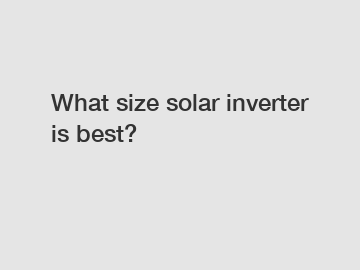What size solar inverter is best?
Solar energy has gained massive popularity in recent years due to its numerous environmental and financial benefits. Whether you are a homeowner contemplating the installation of a solar panel system or a business owner considering a commercial solar array, selecting the right size solar inverter is crucial. The solar inverter converts the direct current (DC) generated by solar panels into alternating current (AC) electricity that powers your appliances. In this blog, we'll explore the factors that determine the best size solar inverter for your needs.
Understanding the Role of a Solar Inverter:
To begin, let's understand the primary function of a solar inverter. Think of it as the brain of your solar power system. It not only converts the raw solar energy into usable electricity but also manages and optimizes the performance of your solar panels. By converting DC to AC power, it ensures a seamless integration between your solar system and the traditional electrical grid.

Factors to Consider When Choosing a Solar Inverter:
1. The Size of Your Solar Array:
The size and capacity of your solar inverter should match the output of your solar array. If you have a smaller solar system, a smaller inverter may be sufficient. However, if you plan to expand your solar array in the future, it's crucial to select an inverter with adequate capacity to handle the increased power output.
2. Maximum Power Point Tracking (MPPT):
MPPT is a technology used in inverters to ensure maximum power extraction from your solar panels. Inverters with multiple MPPT inputs allow you to connect panels facing different orientations or partial shading, optimizing overall system efficiency. Consider the number of panels, their configuration, and any potential shading issues when choosing an inverter with the appropriate MPPT capabilities.
3. Inverter Efficiency:
Efficiency is key when it comes to the overall performance and longevity of your solar panel system. Higher efficiency inverters can convert a larger portion of the solar energy into usable electricity, minimizing energy losses. It's recommended to choose an inverter with an efficiency rating of at least 95%, ensuring optimum utilization of your solar power generation.
4. Type of Inverter:
There are different types of inverters available, such as string inverters, microinverters, and power optimizers. String inverters are the most common and cost-effective solution for residential and commercial installations. Microinverters, on the other hand, provide individual optimization for each panel and are ideal for systems with shading or complex roof orientations. Power optimizers enhance the performance of string inverters in partially shaded areas. Assess your specific requirements and consult with a solar professional to identify the most suitable type for your project.
5. Safety and Protection Features:
Ensure that the solar inverter you choose offers advanced safety and protection features. These may include protection against overvoltage, overcurrent, reverse polarity, and ground fault, allowing for safe operation and preventing damage to your solar panel system.
Conclusion:
Selecting the right size solar inverter is essential for maximizing the efficiency and performance of your solar panel system. Consider the size of your solar array, MPPT capabilities, inverter efficiency, type of inverter, and safety features. Collaborate with a reliable solar professional who possesses the necessary expertise and experience to assist you in making an informed decision.
Remember, choosing the right size solar inverter ensures seamless integration with the electrical grid, enhances system performance, and maximizes your renewable energy generation. Embrace this transformative technology and make a positive impact on the environment with an appropriately sized solar inverter tailored to your unique energy needs.
Want more information on three phase inverter vs single phase, 3 phase solar inverters, commercial solar inverters? Feel free to contact us.


